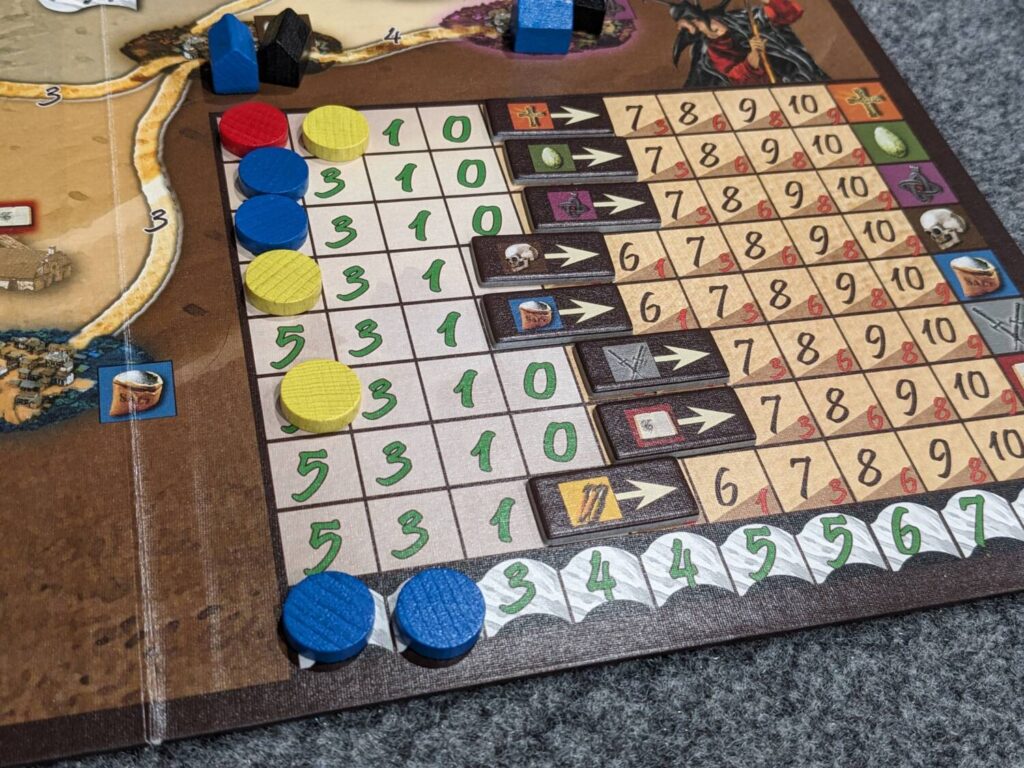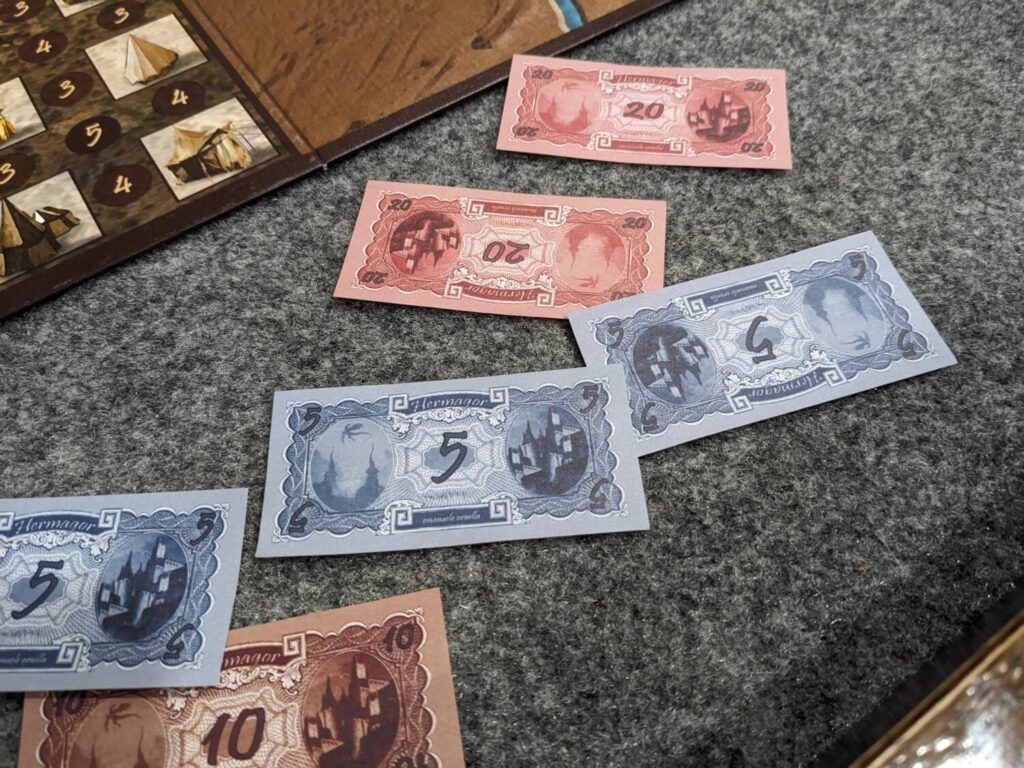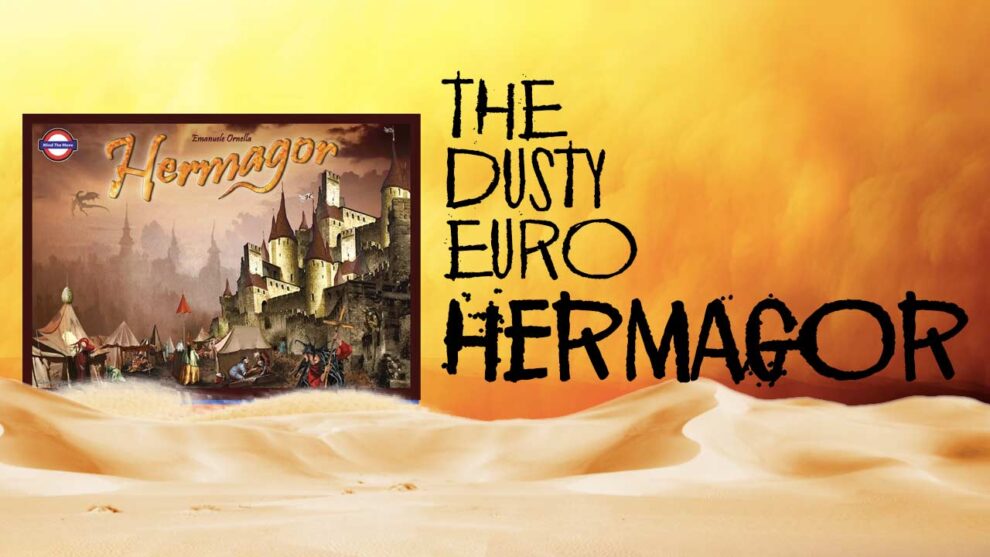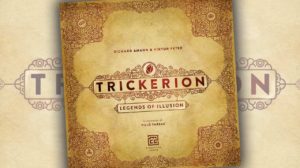The guys in my Wednesday gaming group started a push to play more of the old, dust-covered games at the bottom and backs of our respective game closet shelves. The premise was simple: let’s try to remember why we keep all these old games when all we ever play now are the newest, shiniest things in shrink.
Right on the spot, the Dusty Euro Series was born, and I’ve enlisted multiple game groups to help me lead the charge on covering older games.
In order to share some of these experiences, I’ll be writing a piece from time to time about a game that is at least 10 years old that we haven’t already reviewed here at Meeple Mountain. In that way, these articles are not reviews. These pieces will not include a detailed rules explanation or a broad introduction to each game. All you get is what you need: my brief thoughts on what I think about each game right now, based on one or two fresh plays.

Hermagor: What Is It?
Hermagor is an auction, order fulfillment, and area control game for 2-5 players, designed by Emanuele Ornella and published in the US by Rio Grande Games back in 2006. Players take on the roles of merchants in the fantasy setting of Hermagor—I know it’s a fantasy setting because of the large dragon flying around in the northeast corner of the board!—and players spend 4-5 rounds bidding on spaces of a grid, spaces that hold valuable goods, cash, and player powers that will be utilized later in each round.
Each round is broken into two phases. First, each player uses their four bidding pawns to take turns spending cash to bid on a space during an auction that is only resolved after all players have finished placing their bidding tokens. Then, after each space’s auction is resolved based on an area control mechanic (yes, it’s an auction game, then an area control game, which we will come back to), players take their acquired goods and their cash reserves to execute the second half of each round.
In that second half, each player takes 3-5 turns to move their merchant to deliver a good to a single location, paying travel expenses to move from their current location to any other space on the board. Players must pass if they run out of money. Hermagor tracks the sales price of each good on a series of tracks that generally move upwards each round as the value of goods gets a little juicier throughout the game. Players earn additional bonuses using a second area control mechanic, when they have sold goods to a series of interconnected points in different map regions, and they earn end-game points if they have an area majority of the points along a large road that connects the east and west sides of the game board.
The player with the most money is the winner!

What’s That, Now?
I really love playing older games because you get such great insights into what worked in different eras of the hobby. Hermagor features two of my favorite things about older games. The first is that the rulebook is super light. Even for a supposedly heavier game, Hermagor’s rulebook is like four pages long.
The second thing I love is that there is essentially never a catch-up mechanic in games from 10-20 years ago. If you are behind early in a game like Hermagor, you are definitely going to lose. This also happened with my play of Crude: The Oil Game recently—if you get hosed by any in-game effects early on, it’s lights out! (I’m OK with this. It feels like too many modern tabletop games try to keep players in the running for far too long, even when the game’s overall playtime is relatively short.)
I mention this second item because I was the victim of early-game shenanigans in Hermagor. I’m thankful that I can say that none of these shenanigans were tied to poor game decisions, but rather a confluence of activity near all the goods tokens I wanted to bid on. This led to a crush of bidding near the spaces where I placed my bidding pawns. That meant that I got smoked in the first round, and that left me out of the running for the final three rounds of the game. I knew it, and so did the other three players at the table.

Strangely, that didn’t affect my general appreciation for what was on display with Hermagor. The second half of each round was a fun race to sell goods and establish trading posts that triggered the regional bonuses before other players. There’s paper money—and the paper money is TERRIBLE, with small bank notes that are only one-sided—and playing with paper money once in a while is a fun throwback for me as a player who usually goes with poker chips. Some of the items that can be bid on include travel discount tokens, good tokens that feature two different items to make selling a bit easier, and a power that lets a player skip the payments that go to opponents when establishing a trading post in a location occupied by other players.
That was all great. My negatives with Hermagor boiled down to one simple fact: I have never played a bidding/auction game where players who lose their bid also lose the money they used for the bids. As a result of this, my first round ended with only one acquired good, and essentially no money. I had lost the bid on a half-dozen different items, spending money that was literally risked for nothing.
I own a few auction games and have played dozens more, but I don’t know of other games that feature this mechanic. If Hermagor was designed today, it would make sense that only the final winner of a token has to pay for it, not everyone else who was involved in bidding up the price. Hermagor skirts this a tad, because bidding pawns are placed in different spots around or on a goods token. This means the bidding is for what should be the “best” spots around that token, and you do have some control over these elements, based on turn order.
Would I play Hermagor again? Yes, as long as we could get the playtime down a bit. Our four-player game took about 90 minutes, way too long for such a straightforward game. If a four- or five-player game could wrap up in under an hour, I would absolutely give Hermagor another go.
My play of Hermagor had a lot of fun moments, thanks in part to the folks who joined me at the table. Have you played Hermagor? If so, I’d love to hear your thoughts in the comments below.










